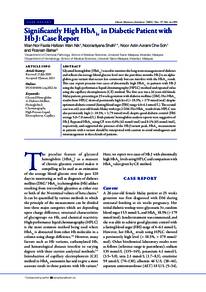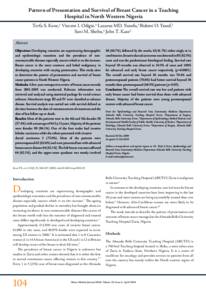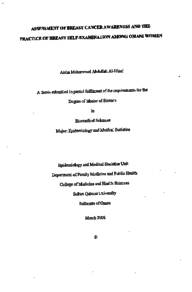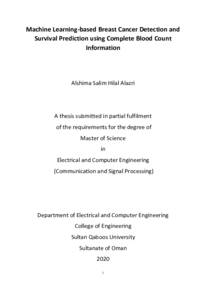Document
Hypo/hyperglycemia induce a unique molecular makeup profile in human parental and metastasized breast cancer cells.
Publisher
Sultan Qaboos University
Gregorian
2013
Language
English
English abstract
Triple negative breast cancer (TNBC) is an aggressive, challenging disease to treat. It usually arises in obese women with type II diabetes. Insulin and IGF1 pathway explained partially the relationship between type II diabetes and breast cancer. Consequently, further exploration of other overlapping pathways will help better understand this relationship. We previously showed that hypoglycemia led to proteosomic degradation of VEGFR-2 in ovarian cancer cells. In this study we investigated whether VEGF/VEGFR-2 signaling pathway bridges between the two diseases. Therefore, we modeled type II diabetes complications in vitro by exposing breast cancer cell lines MDA-MB-231 parental and its two metastatic variants to the bone and brain. The former cells were exposed to physiological, hypoglycemic and hyperglycemic glucose concentrations. On the contrary of what we found in ovarian cancer, hypoglycemia did not degrade VEGFR-2 but rather its posttranslational glycosylation was depleted and reversed rapidly upon the restoration of glucose. Cyclohexamide treatment proved that VEGFR-2 was not a product of de-novo synthesis. Generally, Hypoglycemia resulted in a decrease of the cell proliferation and their ability to form colonies. MDA-MB-231BR showed a unique sensitivity to hypo/hyperglycemia in terms of morphological changes, metabolic activity, secreted VEGF, TGF-B levels and exclusively expressed Integrin-B3 which was proportionally increased with glucose concentration. This molecular profiling might give an insight of how parental and metastasized breast cancer responds to the two well-known drugs metformin and Bevacizumab and hopefully will aid to fine tune the choice of treatment plan by the oncologist depending on whether a molecule is stable or not during the progression of the disease.
Member of
Resource URL
Arabic abstract
إن علاج سرطان الثدي يعتبر من التحديات التي تواجهها المجتمعات. ويعد سرطان الثدي من الأمراض التي تنشأ في النساء اللاتي يعانين من السمنة المصحوبة بداء السكري. يحاول العلماء حاليا دراسة العلاقة بين سرطان الثدي وداء السكري من خلال دراسة المسارات التي تؤثر في المرضين مثل مسار الإنسولين و IGF1. أظهرت دراسة سابقة أن نقص السكر في وسط خلايا سرطان المبيض يؤدي إلى تحطيم 2-VEGFR. لذلك أتت هذه الدراسة لتوضح علاقة هذا المسار بمرضي السكري وسرطان الثدي. لقد تم تعريض خلايا سرطان الثدي (- MDA - MB 231 ) الأبوية والمنتشرة إلى العظام والدماغ لتراكيز مختلفة من الجلوكوز (طبيعية، منخفضة ومرتفعة) والتي تمثل بعض الأعراض التي تصحب مريض السكري. ولقد وجد أن 2-VEGFR لم يتحلل تحت تأثير انخفاض السكر في الوسط المحيط ويعود لشكله الطبيعي بعد إرجاع الجلوكوز إلى الوسط بشكل سريع ولقد دل تعريض هذه الخلايال Cyclohexamide أن هذا البروتين ليس نتاجا لعملية بناء جديدة. بشكل عام، لقد أدى انخفاض السكر إلى تقليل نمو الخلايا وقدرتها على تشكيل المستعمرات. ولقد أظهرت هذه الدراسة أن خلايا سرطان الثدي المنتشرة إلى الدماغ ( MDA - MB - 231BR ) كانت الأشد تأثرا بانخفاض وارتفاع السكر والذي أثر على شكلها الخارجي ونشاطها الأيضي ومستويات انتاج 8-TGF و VEGF والتميز في انتاج Integrin - B3 . لعل هذه النتائج على المستوى الجزيئي لخلايا سرطان الثدي تعطي إشارة عن عدم تقبل بعض حالات سرطان الثدي لعلاج Bevacizumab.
Category
Theses and Dissertations







